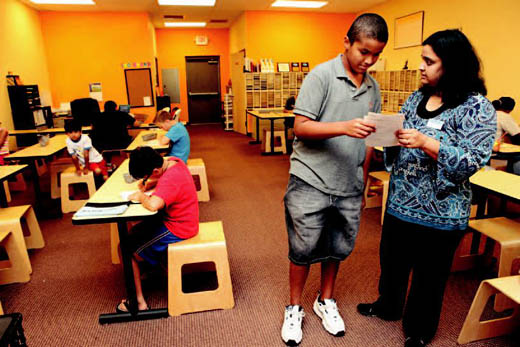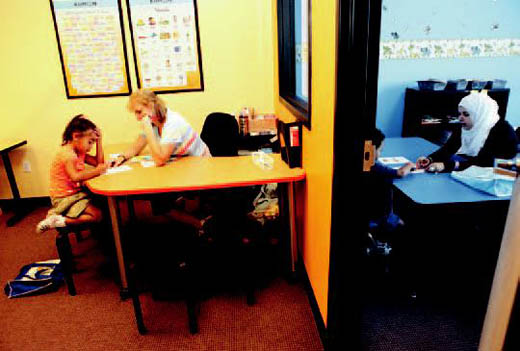Kumon Math and Reading Center: A long-term investment in student success
by Jim Muench
August 20, 2010

Now, the after-school teaching program she used with her daughter has become so popular that she plans to open a second Kumon Math and Reading Center soon in Jefferson City.
Narasimhan, coordinator of the Kumon Center in Columbia, said the program might be a good choice for parents who want to make a long-term investment in their child’s academic future. But for those who only need a tutor for a short time, don’t bother.
“Kumon is not a summer program,” she said. “It’s a long-term commitment.”

Narasimhan came to the US in 1994 from India and came to Columbia in 2003. She first learned about Kumon four years earlier in Lansing, Mich. In 2004, while looking for a job and a good way for her daughter to participate in the program, she applied for a franchise. Someone had begun a Kumon program in Columbia about 10 years earlier, but it was no longer operating, and families had to travel to St. Louis if they wanted to do Kumon.
She said her franchise fees were about $2,000. She also pays monthly royalties of $32 per student and subject; the royalty is higher at first, until a center becomes established. In return, she gets the Kumon teaching materials and can order marketing supplies.
She has worked with more than 1,000 students since 2004, Narasimhan said, beginning with about 10 students and growing to 50 students per subject by the end of that year. Students pay a $50 registration fee and monthly dues of $95 a month per subject. There are no contracts; students pay as they go.
Iris Zachary’s younger son is a student in the program, and her elder son recently graduated and now works as a grader at the center. Zachary recommends Kumon for anybody who wants to use math in a profession, such as students who might want to become engineers.

Students can begin as early as age 3. The only requirement is that they are able to sit still for 10 minutes without interruption. Students can participate until they turn 18. They can take Kumon either for remedial reasons or for enrichment, though Narasimhan said they tend to participate for remedial help now more than in the past.
Saba Yemane, whose three children attend the center, said the Kumon system only works when the center, the child and the family work together. “Manjula is amazing,” she said. “My impression is that it doesn’t work without a good coordinator. She looks at each child’s need as an individual.”
Yemane’s children began the program in preschool, first and fourth grade and have been in the program for four years. “My youngest was way advanced for his age, but kindergarten wouldn’t take him because he was too young,” she said. “He needed something to challenge him. That is how I found out about Kumon, and it served me really well for all three of them. Kumon was exactly what I needed.”

Narasimhan does not consider her main competitor to be other programs that tutor, build study skills or aim for academic enrichment. “The main competition for Kumon is sports,” she said. “Organized sports are the main killer; music programs are not as much of a problem.”
What's Your Reaction?
Excited
0
Happy
0
Love
0
Not Sure
0
Silly
0


